Follow Us丨Book Giveaway at the End
Although there are many programming languages, choosing C++ will definitely not disappoint you!
Powerful, flexible, and complex, the origins of C++ can be traced back 40 years, yet it remains one of the most widely used programming languages today.
Successful programmers have experienced various uncertainties in their past work and life, enduring endless pressure. Their success comes from a common point: they deeply care about the practices required to create software. They view software development as a craft that needs to be refined and honed, holding themselves to professional standards and demonstrating professional ethics.
Great programmers find joy in sharing and achieve more by reading classics.
C++ is a language that is difficult to learn but easy to use! There are numerous related books, and everyone wants to find a magical guide for learning. Here, I will list some classic works in increasing depth, helping you build a solid foundation and broaden your horizons in learning C++.
01
C++ Primer Plus (6th Edition) Chinese Version
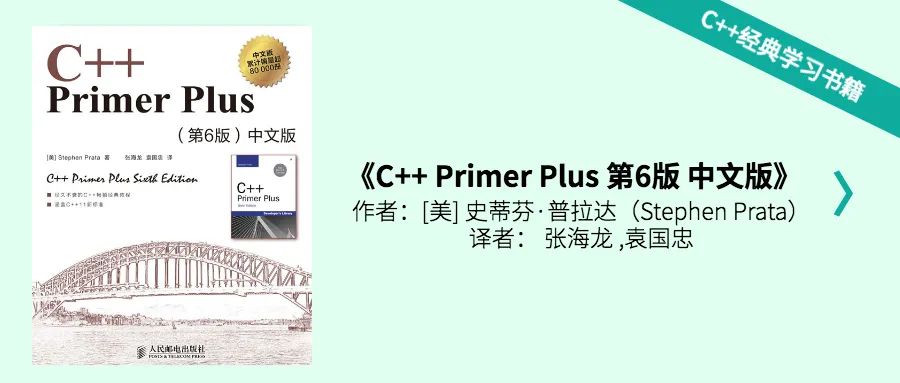
The “C++ Primer Plus (6th Edition) Chinese Version” is a complete C language tutorial that has been carefully tested and designed, covering the core content of C language programming. As a classic work in computer science, it explains programming design principles, including structured code and top-down design.
Like previous editions, the author’s goal remains to provide readers with a beginner-friendly, clearly structured, and insightful C language tutorial. The author skillfully integrates basic programming concepts with the details of the C language, demonstrating one or two concepts through numerous concise examples, encouraging readers to master new topics through practical application.
This is a classic introductory book for the C++ language. The importance of C++ language cannot be overstated; although it is an ancient programming language, it remains robust and is widely used, especially in today’s Linux-dominated environment where C++ remains irreplaceable.
This book is aimed at beginners in the C++ language and serves as a very friendly self-study material. The author clearly explains the foundational concepts of the C language and the programming details to pay attention to, and the rich examples and exercises ensure that readers can achieve the goal of mastering the basics of the C language.
02
C++ Primer Plus (6th Edition) Chinese Version Exercise Solutions
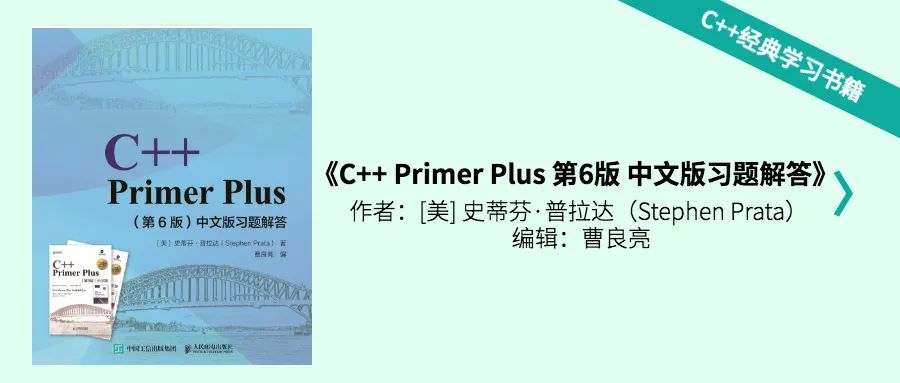
This book is the accompanying exercise answers for the super bestseller “C++ Primer Plus (6th Edition) Chinese Version,” providing problem-solving ideas and answers for the review questions and programming exercises in the book. The book is divided into 17 chapters, with each chapter’s theme completely aligned with “C++ Primer Plus (6th Edition) Chinese Version.”
Each chapter begins with a mind map that lists the knowledge points of the chapter, then summarizes the key content, and finally analyzes the review questions and programming exercises, providing problem-solving ideas to ensure that readers solidify their theoretical knowledge while further enhancing their practical programming skills. As a companion reference book for “C++ Primer Plus (6th Edition) Chinese Version,” this book is particularly suitable for beginners who need to systematically learn the C language, as well as for programmers looking to consolidate their C language knowledge or further improve their programming skills.
03
The Design and Evolution of C++
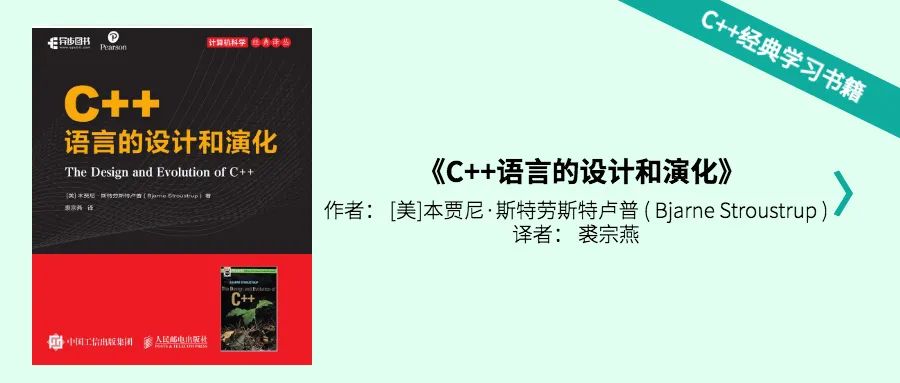
C++ is a language that is difficult to master, and there are countless good books related to C++. However, no book can replace “The Design and Evolution of C++.”
Unlike other C++ textbooks, this book discusses the structure of the C++ language less and focuses more on the evolution and design principles of C++. To deeply learn C++, understanding its design philosophy is more important than knowing the language features. And who better to explain this design philosophy than the creator of C++? This book, written by the father of C++, comprehensively discusses the history and development of C++, various important design backgrounds, and the significance and specific uses behind these designs.
04
Easy C++ Programming for Kids
A Zero-Basis Tutorial for Middle and Primary School Students
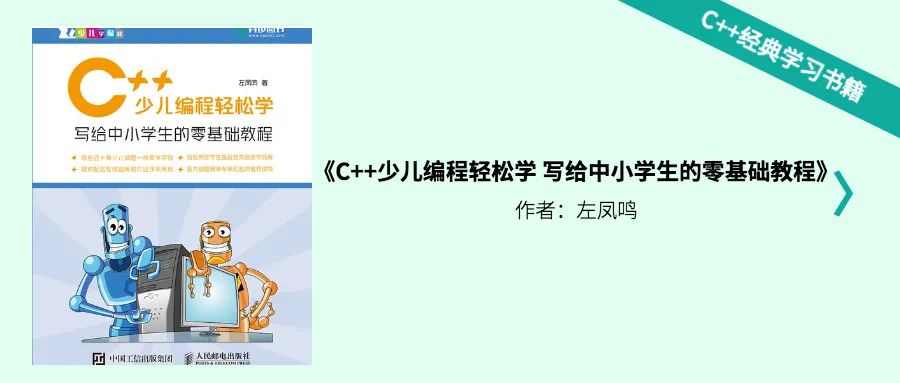
This is a zero-basis introductory tutorial for middle and primary school students. With the rapid advancement of technology, we are gradually entering the era of artificial intelligence, and programming is no longer a special skill; anyone interested can try it. Programming is a great exercise for logical thinking and hands-on ability. Middle and primary school students can not only expand their thinking through programming but also experience the fun that technology brings by practicing in the world of code, enhancing their overall capabilities. This book guides readers in learning C++ programming from simple to complex, covering important knowledge points such as variables, branches, loops, arrays, strings, functions, and also summarizes debugging skills, programming specifications, and exam experiences.
The book contains rich and practical code examples aimed at helping students quickly get started with C++ programming, and under the guidance of the cases, further solidify their C++ programming skills to easily cope with various programming competitions. In addition, this book also provides a supporting question bank for readers to practice on their own, along with a code assignment detection platform to help parents and students evaluate after-class practice and learning effectiveness.
05
C++ Templates Chinese Version
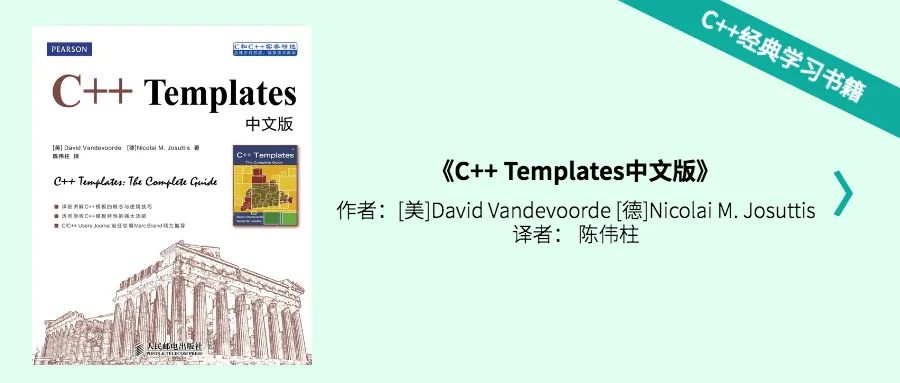
The first edition of this book quickly became an essential guide for C++ software engineers seeking help or comprehensive template reference. This new version connects it with the latest C++ standards and ideas. The examples are concise and illustrative. It provides a practical understanding of modern C++ templates. Understanding this book requires a lot of work, best done while writing applications with templates to fully utilize it. This book is not only an authoritative explanation of C++ templates but also provides in-depth discussions of other general C++ concepts.
“C++ Templates Chinese Version” is a comprehensive guide to C template programming, aimed at laying a solid foundation for readers’ knowledge of C templates through basic concepts, commonly used techniques, and application examples. The book consists of 22 chapters. Chapter 1 provides an overview of the content structure and relevant background of “C++ Templates Chinese Version.” Part 1 (Chapters 2-7) introduces the basic concepts of templates in a structured style; Part 2 (Chapters 8-13) elaborates on the language details of templates; Part 3 (Chapters 14-18) introduces the basic design techniques supported by C templates; and Part 4 (Chapters 19-22) explores common applications of using templates in various programs. Appendices A and B provide relevant information about defining principles and overload resolution. “C++ Templates Chinese Version” is suitable for beginners in C template techniques and can also serve as a reference for experienced C programmers.
06
C++ In-Depth
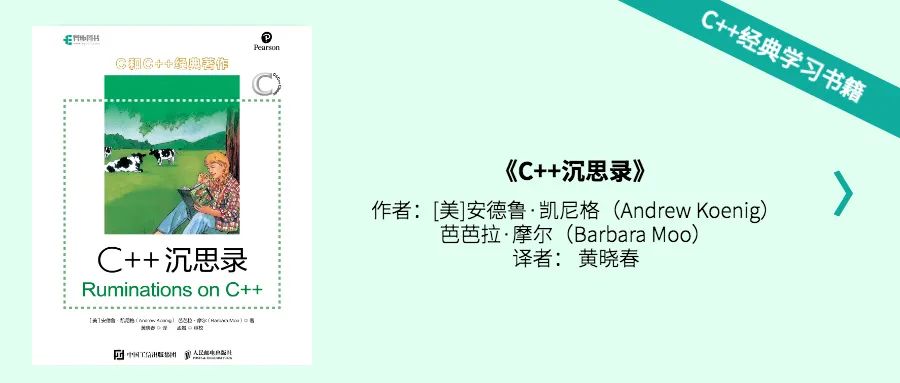
“C++ In-Depth” is suitable for C++ programmers with some experience, helping readers improve their technical skills and become proficient in C++ programming.
Koenig and Moo’s “C++ In-Depth” will provide useful assistance to many. Their foresight about what C++ is and what it can do is evident throughout this book.
This book is based on the author’s technical articles published in well-known technical magazines, speeches delivered worldwide, and lecture notes from Stanford University, synthesizing the author’s insights gained over more than a decade of C++ programming experience.
The book is divided into 6 parts and 32 chapters, discussing in detail the history and characteristics of the C++ language, classes and inheritance, STL and generic programming, library design, and other major technical topics, covering almost all design philosophies and technical details of C++. Through carefully selected examples, the book conveys advanced programming methods and concepts to readers.
This book is suitable for C++ programmers with some experience, helping readers enhance their technical abilities and become masters of C++ programming.
07
101 Rules for C++ Programming Standards, Guidelines, and Best Practices
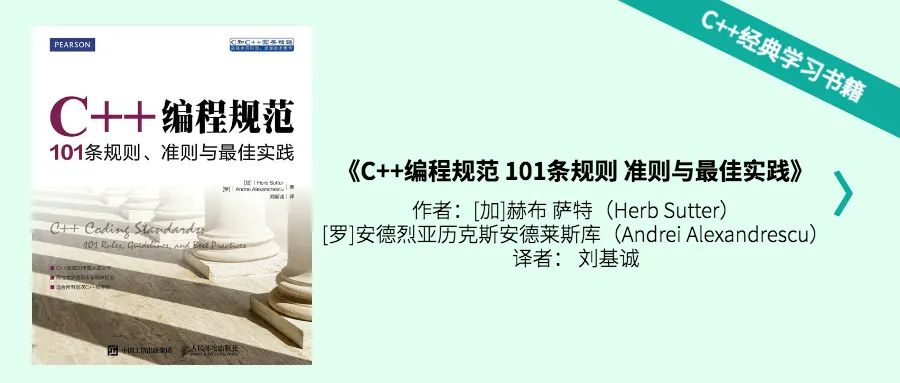
This book is quite suitable for junior and intermediate programmers with some experience in C++. It discusses 101 rules, each explained in a fixed format (including clause title, summary, discussion, examples, etc.). This arrangement is both clear and aligns with our understanding and acceptance of a progressive process.
In “C++ Programming Standards: 101 Rules, Guidelines, and Best Practices,” two well-known C++ experts condense 20 years of collective wisdom and experience from the global C++ community into a set of programming standards. These standards can serve as a foundation for every development team to establish practical development norms and are principles that every C++ programmer should adhere to. Each standard is precisely described and illustrated with examples; from type definitions to error handling, the best C++ practices are provided. Even programmers who have used C++ for many years will benefit immensely from “C++ Programming Standards: 101 Rules, Guidelines, and Best Practices.” This book is suitable for C++ programmers at all levels and can also serve as a teaching reference for C++ courses in higher education institutions.
08
Practical C++ Concurrency
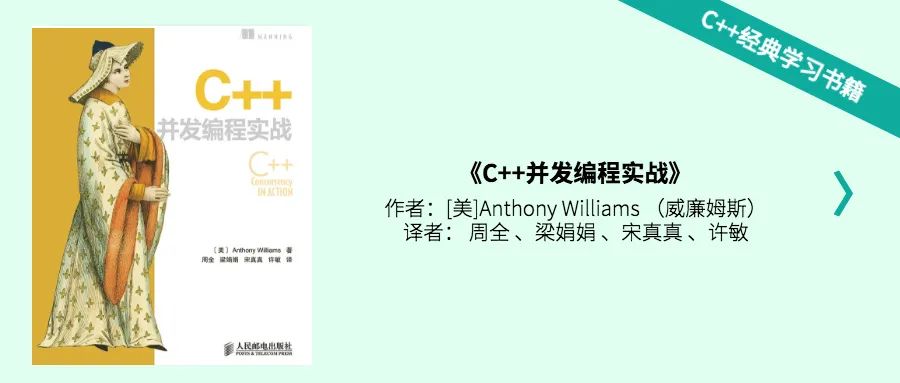
In the field of C++, there are few books on multithreading. After all, multithreading is something outside the language for C++. In Linux, it is provided by pthread, and in Windows, it is provided by Win32API or .NET framework. After the C++11 standard incorporated threads, threads became part of the language, which is what this book addresses.
The content is quite rich, covering not only the standard but also some basic multithreading programming experiences, such as how excessive locks can lead to cache thrashing, how to design a thread-safe version of a class, and even a chapter dedicated to lock-free design. Everything that should be said is covered. In terms of standards, the basic concepts are explained clearly (including some new syntax like rvalue references), but the memory model is not thoroughly explained; it only briefly discusses basic usage. However, this area has not yet been fully supported by GCC, which may contribute to this reason.
“Practical C++ Concurrency” is an in-depth guide to concurrency and multithreading programming based on the new C++11 standard. It covers the use of basic classes such as std::thread, std::mutex, std::future, and std::async, as well as memory models, atomic operations, construction of lock-based and lock-free data structures, and extends to parallel algorithms and thread management. Finally, it also introduces the testing of multithreaded code. The appendix briefly introduces projects related to multithreading in the new C++11 language features and provides a complete reference for the C++11 thread library. “Practical C++ Concurrency” is suitable for readers who need to deeply understand C++ multithreading development, as well as for developers and testers using C++ for various software development. Readers using third-party thread libraries can also find relevant guidance and techniques in the later chapters of this book. Additionally, this book can serve as a reference tool for the C++11 thread library.
09
Qt5.9 C++ Development Guide
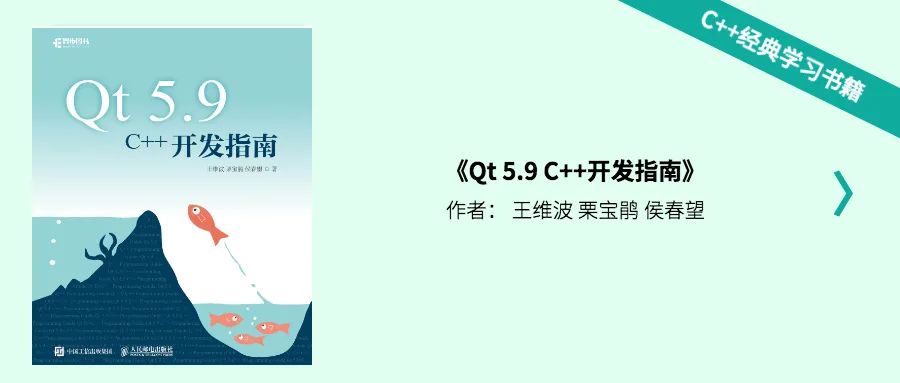
This book provides a systematic study of Qt and is tutorial in nature, also serving as a reference manual. Beginners in Qt can start programming after reading the first six chapters. This book is based on the Qt 5.9 LTS version as the development platform, detailing the techniques for developing applications using Qt C++, including the basic architecture of Qt applications, the working mechanism of signals and slots, the Graphics/View architecture for graphical display, the Model/View architecture for data editing and display, and the design and invocation methods for dialog boxes and multiple windows. It introduces the use of commonly used interface components, file reading and writing, drawing, charts, data visualization, databases, multithreading, networking, and multimedia modules. Each programming topic is carefully designed with complete example programs.
By reading this book, you can understand the basic techniques required for Qt C++ application development. This book is suitable for readers who have a basic understanding of C++ programming and wish to develop cross-platform applications using Qt C++.
10
Introduction to C++ Game Programming (4th Edition)
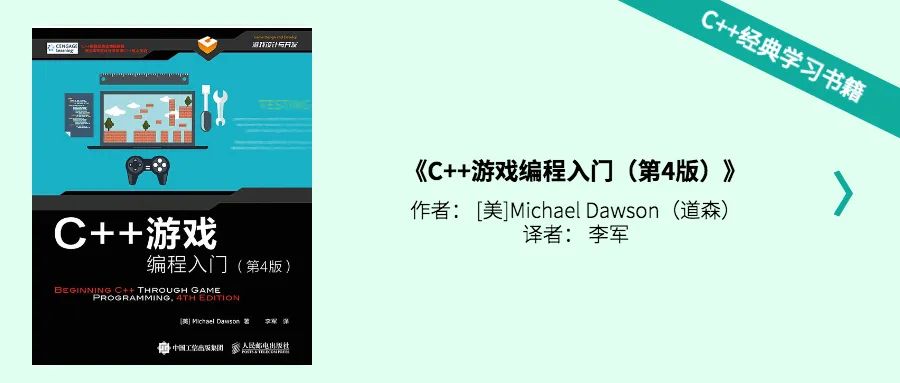
This book introduces the C++ language from the perspective of game programming, being both ingenious and interesting.
The book consists of 10 chapters, each covering one or more important areas of C++ language knowledge, while also practicing and explaining through the development of a game example project. At the end of each chapter, important concepts are combined in a game project. The final chapter will create a relatively complex game that integrates all the major concepts introduced in the book. As learning progresses, readers will learn how to organize programming projects, how to break down problems into manageable sub-problems, and how to refine code.
This book is suitable for anyone interested in writing games, primarily targeting beginners and assuming no prior programming experience. By reading this book and practicing through experiments, readers will lay a solid foundation for mastering the C++ language and game programming.
11
C and C++ Programmer Interview Secrets
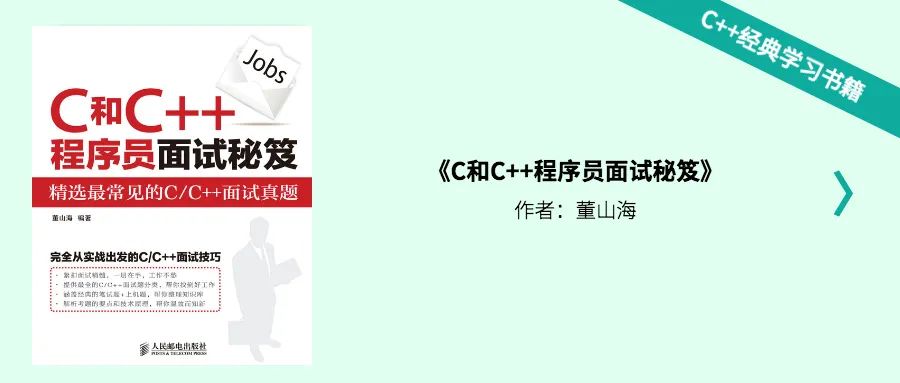
Many languages have borrowed from C/C++, so the foundational knowledge of C/C++ is very important for software developers.
“C and C++ Programmer Interview Secrets” is a book that analyzes C/C++ interview questions, helping job seekers better prepare for interviews. It includes 12 chapters covering common interview question types and focuses in enterprises, including C/C++ programming basics, preprocessing, const, static and sizeof, references and pointers, strings, bit operations and embedded programming, C++ object-oriented programming, C++ inheritance and polymorphism, data structures, sorting, generic programming, STL, algorithms, and logical thinking.
“C and C++ Programmer Interview Secrets” provides a deep understanding of the technology behind each point of focus through technical analysis and code support, making it a treasure trove for C/C++ programmers looking for jobs and recent graduates.